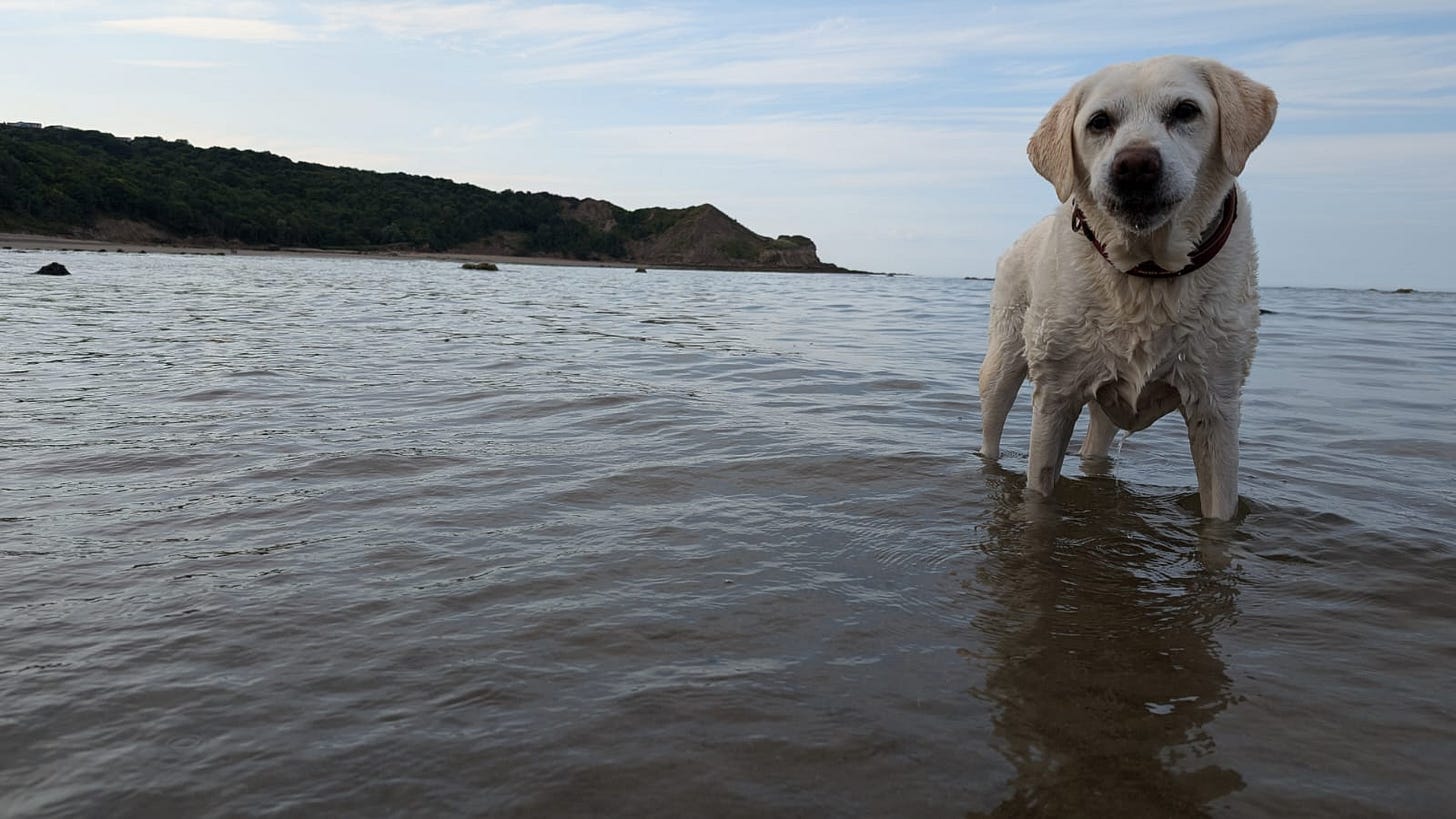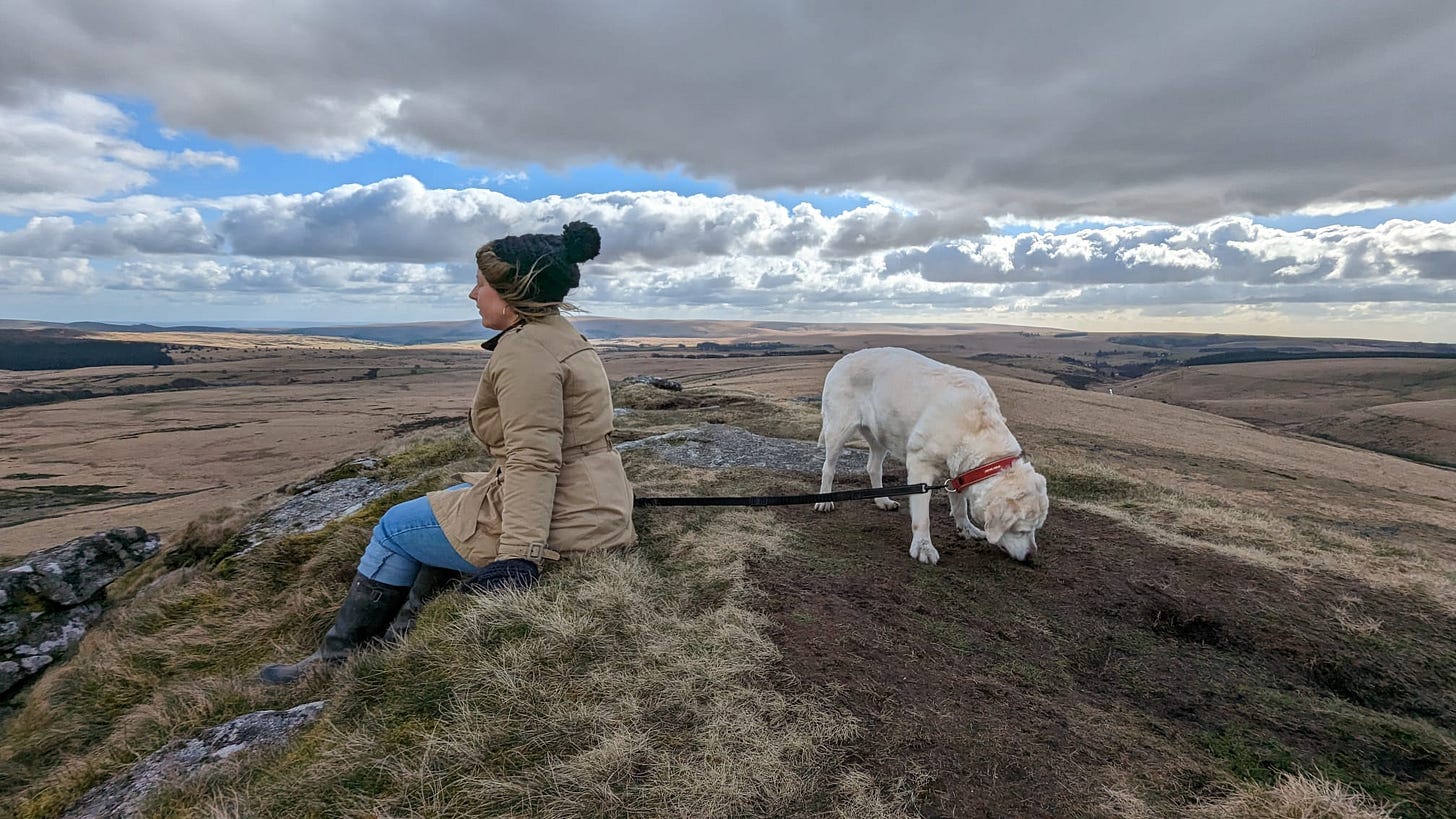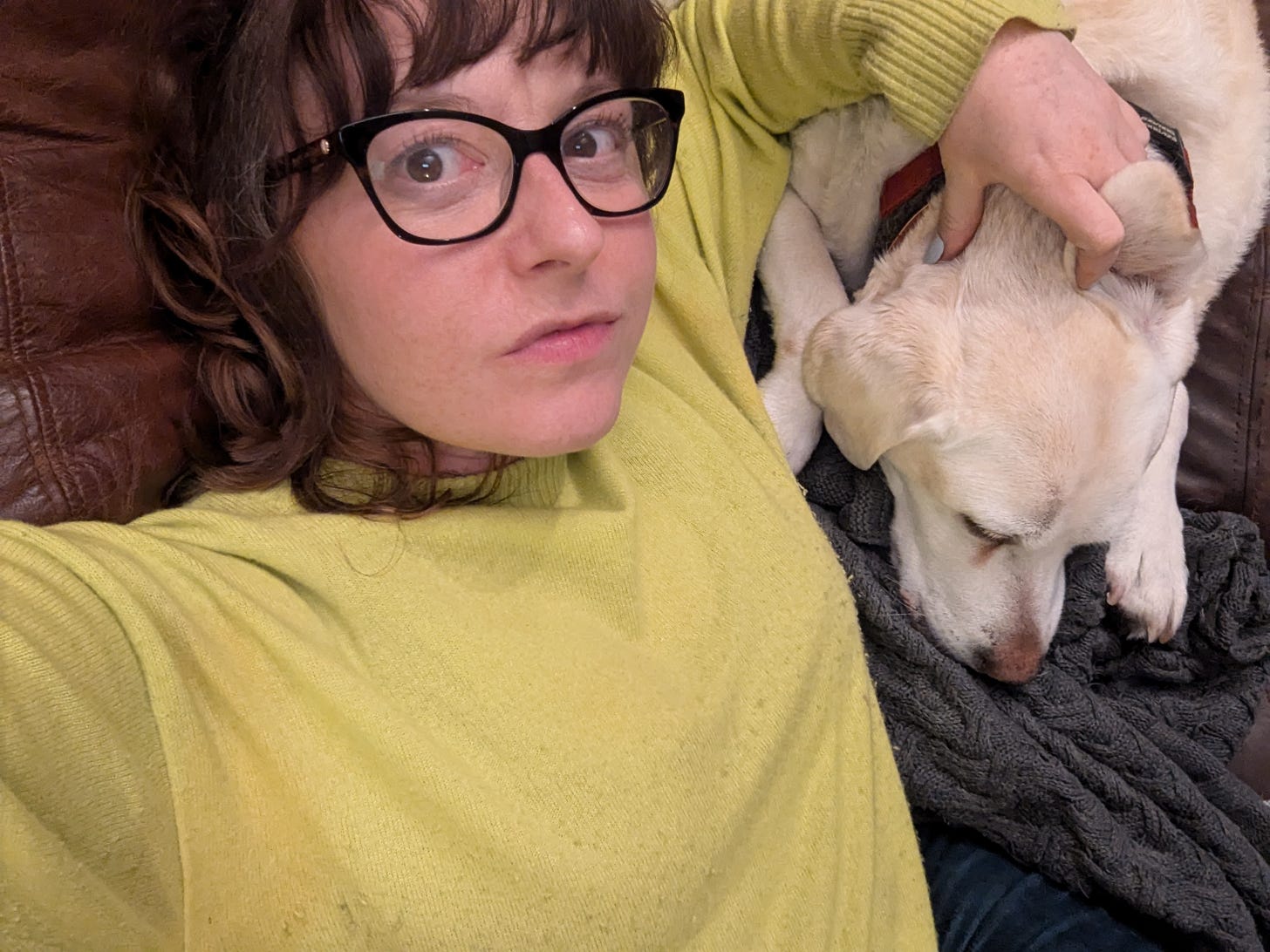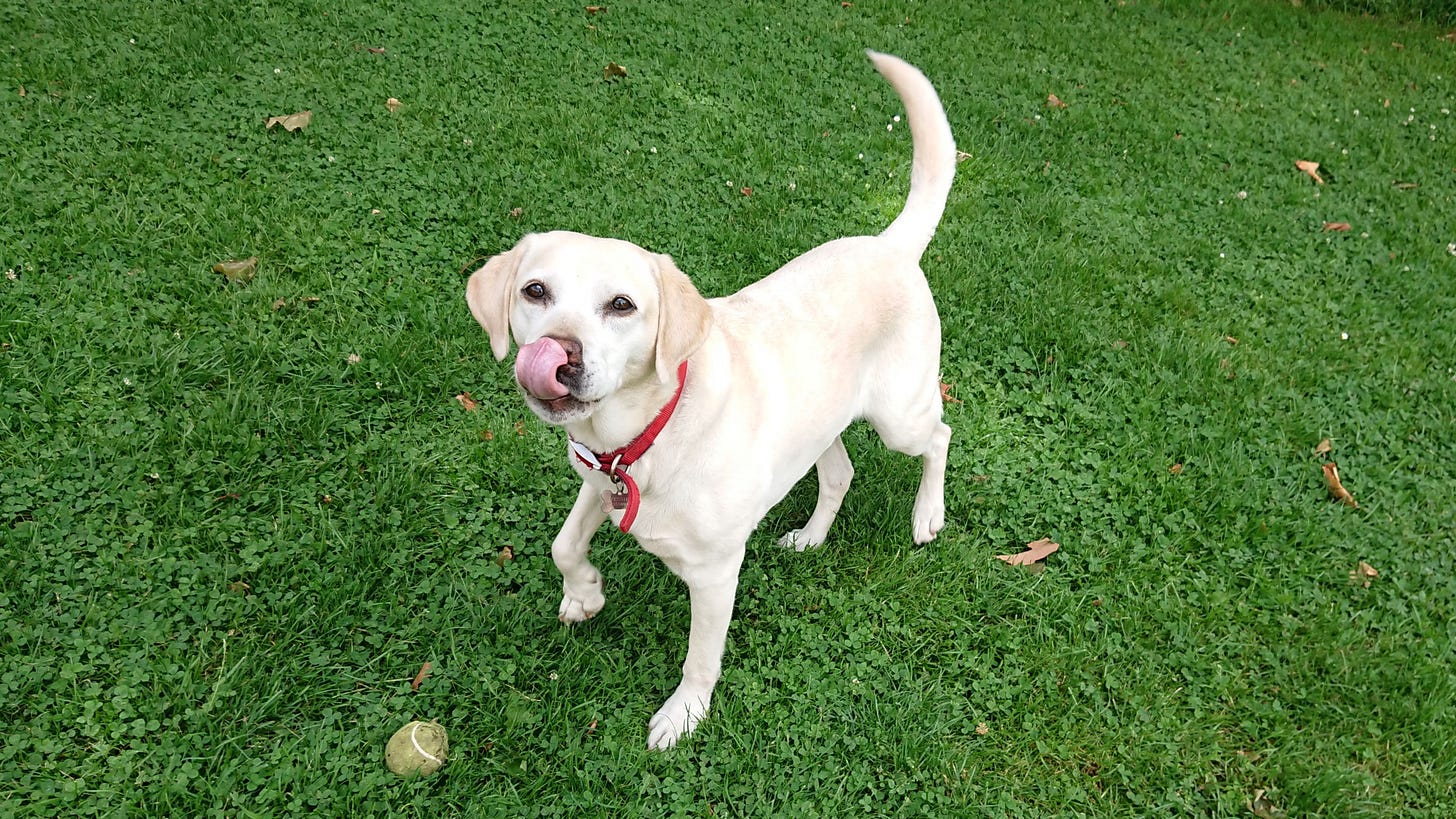This is a sad Tox Report, because it’s been a sad week here. At the bottom of this newsletter, you can find listened (Metronomy), watched (A Real Pain) and read (Open Socrates), plus the usual links. If reading about Jessie makes you feel like doing a nice thing for dogs, the charity Canine Companions — which trains and provides assistance dogs to people with disabilities — would be a very worthy recipient.
In 2018, the dog next door came to live with us. Her name was Jessie and she was a seven-year-old labrador retriever with a white-blonde coat and massive black eyes. The day my neighbour came to drop her off (ex-neighbour by then to be precise, because the reason Jessie came to us was that her owners had to move at short notice and couldn’t find a pet-friendly rental), Jessie walked across the room and tucked herself under my feet.
“Look,” said my (ex-)neighbour, “she’s happy with you already.” And Jessie really was the most amazingly contented dog. Very soon after she moved in with us, she graduated to the sofa (despite my protests, which were not very heartfelt) and she was always blissful when curled up like a croissant next to one of her people.
She didn’t beg for food (despite being a labrador and so in a genetically dictated state of constant hunger), and she would bark only in an emergency (for example, if you left her waiting too long in the garden, or if another dog came into the cafe we were in). But she would ask for your attention by gently headbutting you or by easing her snout under your hand. Sometimes this annoyed me (if, say, I was in a cafe and trying to work). But I would of course give almost anything to feel the soft pressure of her face nuzzling me again now.
Jessie loved to chase a tennis ball and she loved to swim. If you played fetch until she was tired, she would hold the ball in her mouth and refuse to let go, as if she knew that she would be unable to resist the pursuit if she let us throw it again.
She almost never ran off, unless there was a sea or river to run into (or something to eat: she was a labrador after all). When we were on a walk, Jessie could sense water long before a human could see or hear it: her ears would prick up and her tail would go wild, and you had to put her on her lead sharpish or within a few seconds she would be in the river and paddling around, snorting with excitement.
It feels silly to talk about a dog being “talented” when all Jessie was trained for was being a domestic companion, but she was very, very good at enjoying herself. That was her talent, and it was contagious. It was impossible not to catch a little bit of Jessie’s delight at running through long grass, or splashing into a puddle, or hopping up next to you and having her rump scratched (confusingly to people who didn’t know her, one of the greatest honours she could bestow was to present her bottom to you for a good rub).
When my son was a teenager and every human in the house was intolerable to him, Jessie was the one family member he wanted to be close to, and she would flop onto him like a teddy bear. In the time we had Jessie, my daughter grew up into a frankly intimidatingly cool young woman: I would still overhear her chatting away to Jessie in a baby-talk voice that Jessie listened to with perfect focus. When very few things made my grandma happy in her very old age, Jessie did. During lockdown, Jessie became the justification for long family walks, and likely saved us all from going utterly insane.
Jessie was diagnosed with arthritis about two years ago — a common issue in her breed. She didn’t suffer the worst of it initially because we had managed to keep her weight down, though pictures show the tell-tale swelling in her paws had started earlier. We stopped playing ball (the torque on her joints was disastrous, said a very stern vet) and Jessie accepted this uncomplainingly. Metacam (an anti-inflammatory) helped for a bit.
Then last summer, it stopped being enough: her back legs began to fail suddenly underneath her, and I took her to the vet in tears, expecting the worst. That wasn’t the end, though. We started her on monthly injections of a drug called Librela, which blocks the pain from arthritis. Lots of dog owners describe Librela as miraculous, and it was for Jessie: the collapsing stopped, and she loved her walks again.
When we went to Cornwall for Christmas, she ran happily in the surf — but then a wave knocked her over, and her demeanour suggested an utter feeling of betrayal. This wasn’t supposed to happen. I think of that moment as the beginning of the end. It was the first of all the last times we would have in the weeks to follow: in that case, the last time we took her to play in the sea.
In early January, she stopped being able to enjoy herself. Her usually windmilling tail hung forlornly between her legs. Before this she also, and apologies that this is disgusting, stopped being able to control her bowels. I think she found this particularly stressful, because she was a very clean dog. You think you would find it unbearable to have to disinfect the floor once a day, but actually you get used to these things: first you rationalise it as exceptional, and then you rationalise it as unexceptional. Anyway, this is what dying is like, and it would have been futile to be disgusted by it.
She could walk, but only very slowly, and without realising it, our world started to shrink to fit her. Walks got shorter, flatter, closer to home. And then the collapsing began: Jessie would flop down onto the ground, and only be able to get up with help, which she received with equanimity. But still, the fact was that Jessie was no longer mobile. This meant that she and I couldn’t leave the house: a problem, because we had building work ongoing, so I sat next to Jessie on the sofa every day and stroked her little croissant body and told my editors I couldn’t work, which felt ridiculous but was the truth.
She was losing weight by the week, and sometimes by the day, which I knew because we were at the vets a lot in this time and they weigh your pet as you arrive. One vet prescribed more painkillers; I asked how long we had left, and she gave an answer in months which I found hard to believe. A few days later, I came down in the morning to find Jessie on her sofa, and when I tried to help her get up, she rolled noiselessly onto the floor.
The vet is 300 metres from our house, and Jessie couldn’t walk a step. I had to carry her the whole way, all 25 kilograms of her, and when I staggered into the waiting room I saw a man I used to work with and he was kind to me because he knew, we both knew, there was no way Jessie could be OK again. In the consulting room, I choked up the word “euthanasia” and the vet offered me the consent paperwork right then; I said we needed one more day. In my hands, Jessie felt as soft as a puppy.
Then as I helped her up so I could lift her off the table, she lurched forward and I thought something terrible was happening but she was just plunging her face into the pot of treats that the nurse had left on the table. “Nothing wrong with that end,” said the nurse fondly. And this was one of the things that made the last days so painful: there really was “nothing wrong with that end”. Jessie still gave and received affection. She still loved food. Her tail would swish, albeit weakly, when she saw her people.
I repeatedly took dog quality of life questionnaires in those last days. I think I wanted to be given definitive sanction for the thing I already knew I had to do. Of course, no such sanction exists. The thing about pet owning is that you, the owner, take the responsibility with the love. It is your privilege to make that last call, however much it does not feel like a privilege when it comes. They can’t make it for themselves, and no one else can make it for you. No one else should make it for you.
On the last day, I got up early and sat with her on the sofa till everyone else in the family was awake (I had asked the builder to take the day off and he agreed readily, showing me the memorial tattoo he’d had done in honour of his own dog). I decided to watch Lost, and then I felt stupidly bad that Jessie would never know the ending, and then I thought, well maybe this is the best way to experience Lost anyway.
That day was a good day for Jessie. She could get around, with a bit of human help, and she had four humans to help her. We all went to some nearby woods where she trotted along gamely, albeit with a bad limp; she even struck off by herself a couple of times to sniff things, only ever wandering a few feet away, but still, doing more than she’d been able to for weeks. We all cried, trying not to let Jessie see.
Part of me, a selfish part, wanted the validation of a day as bad as the one before. Maybe it’s too soon, I thought, watching her stumble through the leaves. Maybe there could be a few more days, even weeks. But none of them would have been better than this day. This was her gift to us. This was our gift to her. One last good day.
We took her home. We all sat round and hugged her. We fed her bacon. We kept our appointment with the vet that afternoon. I’m not sure I want to write about this part. The vet was gentle, kind, practical. Jessie went to sleep quickly, and then her heart stopped and it was over. Such a soft slipping over the boundary from life to death. We took her home.
In the garden, we dug a grave — my husband and I — and buried her wrapped in her beach towel with some tennis balls for grave goods. It is a hard thing to place someone you love, a member of your family, into the ground. Dementedly, I worried about her being cold in the black earth. I worried about her being alone. I thought, so this is magical thinking.
For days, I was haunted by the fear that we somehow hadn’t done it right. At the same time, I knew that this was the only right thing we could do, the last loving thing, a final kindness. Ours were the last hands she felt alive, and the last ones to touch her body. There is comfort in duty. Now she’s part of the garden she had patrolled and explored since her puppy days. In the spring, I will plant a tree for her. Maybe it will grow tennis balls.
When you get this, Jessie will have been gone for a week. I miss her — we all miss her — every day. When I wake up in the morning, I remember again that she’s not waiting downstairs to see me. When I’m out the house for more than a couple of hours and start to feel a pang to go home, I remember there’s no Jessie wondering when her people will be back. At teatime I think, but Jessie hasn’t had her walk. And there are no more walks to be had.
One of the most difficult things, though, was that as soon as she died I felt a strange lightness. For weeks (for longer really), Jessie had preoccupied my thoughts until I was barely aware that these were thoughts at all: when I was with her, it was my constant job to monitor her for when she needed help to move, when she seemed in pain, when she needed comfort. It was only when she was gone that I realised how hard I was working to manage her needs; and if I was working that hard, she must have been struggling so much. When I second guess myself (still), I remind myself of that.
“She’s a dog,” I used to say crossly when I thought my family was giving Jessie too much human food, or letting her hog the sofa, or telling her off for things she couldn’t understand. (To be fair, they used to say the same to me when I insisted on dressing her in a little Barbour dog coat in winter or on buying the most expensive dog food.) I never meant she was just a dog, though. I meant: love her completely as the thing she is. I meant: let her love us back, as a dog. She loved us so well. She was such a good dog.
Listened
Metronomy, “The Look”
A friend recently described the perpetual availability of all music ever as “like trains arriving at the terminus and everyone spilling onto the platform at once”. Anyway that was how I felt when this song — a song I liked when it came out in 2011 but had sort of slipped my mind — popped up on my daughter’s playlist adjacent to the Beatles and a Tribe Called Quest. But it’s also a good description of this song itself, which is a gigantic Northern Soul stomper landed out of time. I struggle with Metronomy at album length, when the limitations of Joseph Mount’s voice get difficult to overlook. But single by single, they are tremendous.
Watched
A Real Pain (general release)
I wrote for the Times this week about how I did not like The Brutalist. I came away from that film feeling like I’d been subjected to an emotional grift — the film takes its heft from two huge traumas (sexual violence and the Holocaust) in a way that strikes me as meretricious and unearned. A Real Pain is the opposite of all that. It’s a film about the messiness of historical trauma: who is “allowed” to feel what, what is the “right” way to grieve, when does the past become the past.
The “real pain” of the title is the quest for an “authentic” experience of genocide undergone by cousins Benji (Kieran Culkin) and David (Jesse Eisenberg, who also wrote and directed) on a Holocaust tour of Poland. But it’s also a description of charismatic, chaotic, self-destructive Benji, who is the definition of a pain in the arse. David is driven to breaking point by both his cousin’s antics and the apparent way he goes unpunished because of his charm. This film sits in the unsteadiness of love: no hard resolutions, just two people trying and failing to be enough for each other.
Read
Agnes Callard, Open Socrates (Allen Lane)
OK fine, I will admit that I read this because the author got social media famous for her unusual domestic arrangement and I was nosy about how that fit with the idea of a “philosophical life” (Callard, a philosophy professor, was married with two children when she fell in love with one of her grad students; she married the student and she, the student and her ex lived together). But! I was genuinely taken with Callard’s passion for the Socratic method, even though this is a book that makes very few concessions to readers who don’t appreciate the philosophic style.
As she describes Socratic philosophy, it’s really a way of doing thinking through conversation. There is much more to it than that, and honestly sometimes this book does fulfill the prejudice that philosophers are just people who like making obvious things difficult; but I came away from it feeling really moved by the idea that knowledge is and can only be cooperative. Whether you can find the right person, or throuple, to cooperate with is another matter.
Gimme, gimme more…
“[Writers were told to] ‘Be more like Neil Gaiman.’ And what was Neil Gaiman? Always online. He kept a public journal, logged into social media like it was his day job, and did lots of public appearances with marathon sessions of meet-and-greets and book signings. He took very public stances on political issues, leading him to be elevated as an important ally and spokesperson. He took up long correspondence with fans and students. That he was doing this not only to sell books but also to source broken teenage girls for his sex life was something of a running joke. The only people who truly benefit from erasing the boundaries between creator and audience are those eager for unhindered access to the awestruck and the manipulable.” Jessa Crispin on Gaiman, Palmer and the long con of the attention economy (free to read):
It’s hard to describe what Arwa Mahdawi’s beat at the Guardian is: something like “correspondent for saying things that sound superficially clever to the right audience but are on a cursory inspection wholly vacuous”. Basically she scoops up the kind of internet take that makes readers nod smugly and click retweet, and tries to make them seem more substantial than they are. Last week this meant she had a go at arguing that Trump’s executive order on sex made everyone in America legally female, in an article called: “After his executive order on sex, is Trump legally the first female president?” (Guardian, free to read.) “It would be extremely satisfying if the answer to that question was an unequivocal yes,” she writes, midway down. “But the more accurate answer is: No.” Yet somehow she wrote it anyway!
It gets even dumber when you learn she asked actual sex difference scientist Carole van Hooven for comment and then… ignored her. (Twitter.)
“People think their feelings are so real now that they’re not worried about facts at all […] Yes, what you feel is true, in that you do feel it. But how you’re talking to yourself, to make you feel what you’re feeling, might not be true. And people haven’t quite got that. As panic rises, people feed it by having more pessimistic thoughts. And there has to be a better way of ordering your mind.” Philippa Perry on our “reality crisis”. (Times, paywall/registration.)
A story in three acts. (Twitter.)










I lost my Molly at the beginning of last year and I still cry about it. It’s the most dreadful thing, but they are the best things so make it all worth it I guess. She was 15 - the most beautiful collie dog you’ve ever seen. We went through almost the same - loss of mobility followed by the miracle of Librela, but blindness took her will to live in the end. It totally broke me to see her give up. I held her at the end.
We pledged not to try and replace her, but ended up with a puppy, who is a nightmare and helps to heal the hurt a little. She’s a ratty little collie from two working parents who looks at you with terrifying analytical eyes. I love her to bits.
I still want my Molly back though.
Dogs - we don't deserve them, and they don't live long enough. Lovely, heartbreaking, piece.